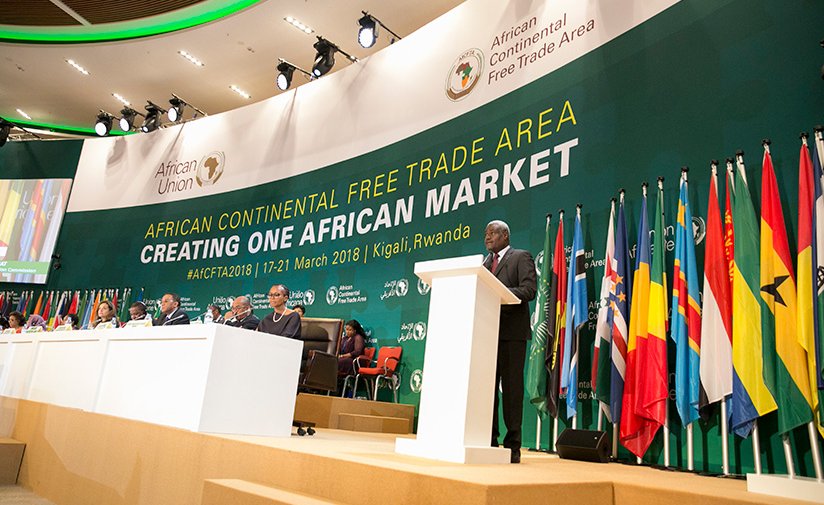- Implementation of the agreement’s protocols will be incremental, with the private sector (the real traders) needing access to the correct information.
The founding agreement of the African Continental Free Trade Agreement (AfCFTA) enters into force today. The required number of ratifications has already been deposited and the agreement can now become a binding international legal instrument.
This constitutes an important political achievement but will not usher in immediate free trade; several legal instruments must still be finalised. National legal regimes must also be updated to reflect interstate agreements. International trade agreements are not self-executing; they are implemented through domestic measures such as new customs procedures and domestic regulations for foreign service providers and investors.
The entry into force of the AfCFTA agreement is the first step towards the formation of a comprehensive free trade regime for Africa, under the auspices of the African Union (AU). The implementation will be incremental. There will be one overarching trade arrangement, but specific commitments and opportunities will depend on the detail contained in the respective schedules. The private sector (the real traders) will need access to the correct information.
This agreement provides the anchor for several additional protocols, once the outstanding negotiations for each are completed. The negotiations for the AfCFTA protocols on trade in goods and services are well-advanced, but tariff schedules, rules of origin, and specific services sector commitments remain outstanding. The AfCFTA envisages liberalisation and integration of the services market. Priority sectors are transport, communications, financial services, tourism and business services.
Transport, communication and financial services are key inputs into all economic activity, and so are very important for the development, diversification and transformation of African economies. They can contribute to improving the competitiveness of all economic activities, from agriculture to manufacturing, and services sectors such as healthcare and education.
Member states still have to negotiate specific commitments for these sectors. Practical considerations such as axle load limits can also be harmonised to enhance efficiency of transport across borders. Such considerations remind us that these services are very important to improve trade facilitation to increase intra-African trade. And improving trade facilitation also improves Africa’s trade with the rest of the world.
The AfCFTA will eventually comprise protocols on trade in goods; trade in services; dispute settlements (these have been negotiated during phase one); co-operation in competition; intellectual property rights; and on investment. The last three protocols will be concluded during phase two, the negotiations for which will kick off soon.
Ambitious enterprise
The outstanding issues in phase one cover essential aspects of this ambitious enterprise but involve technically complicated matters. The 55 AU member states are at very different levels of economic development, with some quite dependent on tariff revenue. The modalities for the tariff negotiations have not yet been finalised but present indications are that the least developed states will push for a special dispensation.
Each state will submit its tariff concessions and will probably have its own tariff schedule. This unique approach is justified by invoking the variable geometry concept, which provides for regional integration at different speeds.
It will, however, make implementation more challenging. National tariff books must reflect this state of affairs. Importers and exporters in other state parties should know what the applicable tariffs and rules of origin are. The technical information should be available, up to date and reliable. Uncertainty undermines commerce and investment decisions.
The outcomes of the negotiations must also be notified to the World Trade Organisation (WTO). An African trade observatory is to be established to become the repository for trade and trade-related data. It could also host a database of notifications by members for the implementation of their commitments. Implementation will require appropriate national rules, transparency, notification of national trade measures and compliance monitoring. This will increase transparency and access to information on the state of implementation. The private sector will be a major beneficiary of transparent notification.
There should also be domestic trade remedy regimes to deal with unfair trade practices and surges in imports causing injury to domestic industries. Most African governments lack the necessary institutions and laws. The courts of the land seldom rule on disputes involving trade remedies and trade governance issues.
The regional economic communities, such as the Economic Community of West African States, the East African Community,SADC and the Southern African Customs Union will remain in place and be maintained, as Article 19 of the AfCFTA agreement provides. Future intra-African trade will consist of different layers of obligations and arrangements.
If the AfCFTA is properly implemented, trade governance, customs administration and rules-based trade should benefit. All trade arrangements, including those with Africa’s most important trading partners (they are outside the African borders) should benefit. Africa should become a more attractive investment destination. The biggest challenge for the AfCFTA will be about rules-based governance and transparency at home.
Source: Businesslive










